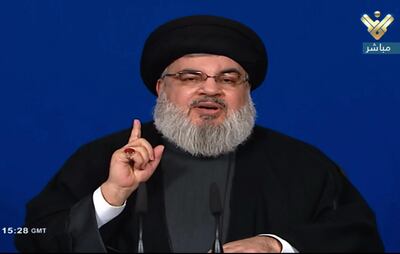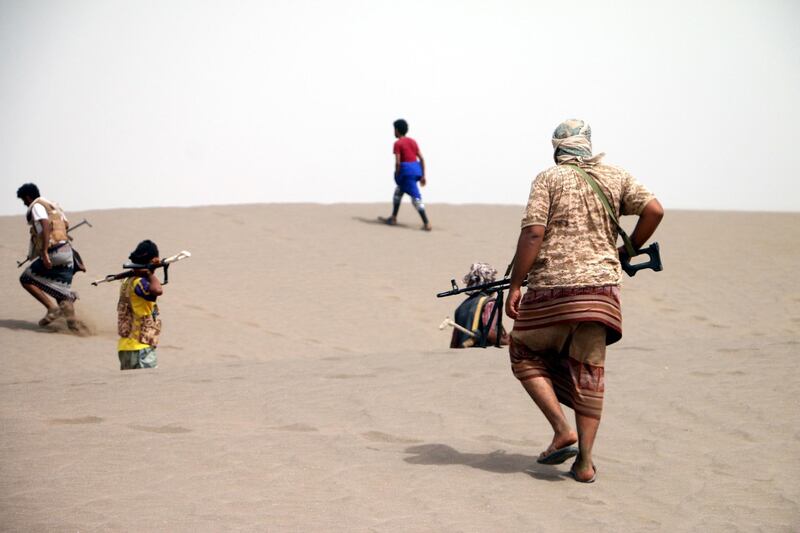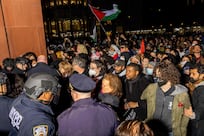Yemen’s Foreign Minister Khaled Al Yamani filed a complaint to the United Nations against Iran-backed Lebanese group Hezbollah, which has declared its support for the Houthi rebels.
In his letter, a copy of which was seen by The National, Mr Al Yamani addressed Lebanese Foreign Minister Gebran Bassil, saying he "regretted to point out that Hezbollah has abandoned the brotherly approach [between Yemen and Lebanon] … and abused the strong and established relations by its participation in training, planning, inciting and supporting the Houthi militias since the 2014 coup".
He said that Hezbollah chief Hassan Nasrallah's June 29 speech, in which he expressed support for the Iran-backed Houthis, was "a blatant intervention in the internal affairs of my country, which would cause great damage to Yemen's supreme interest and national security".
________________
Read more
Coalition says foreign military experts are training Houthi militias
Eight Hezbollah fighters killed in Yemen
_______________
Mr Al Yamani urged the Lebanese government to take measures against Hezbollah’s “hostile behaviour”.
In his speech last month, Mr Nasrallah addressed the Houthis and said: “I am ashamed that I am not with you. I wish I could be one of your fighters and fight under the guidance of your brave and dear leaders.”
The Hezbollah chief also denied reports that eight of his party members were killed fighting alongside the Houthis in the Saada province last month.

“We’ve recently said that for certain reasons and interests, we do not say whether we have a presence in Yemen ... but whether we’re there or not, I categorically deny that there are Hezbollah martyrs in Yemen – not in the last few days nor in recent years,” he said.
An Arab diplomat who spoke to The National on condition of anonymity said that Hezbollah fighters and advisers were working alongside the Houthis in key locations. He said that a senior Hezbollah commander was present in Hodiedah.
Last April, the Khaleej newspaper reported that families of senior Houthi leaders in Yemen had fled to Beirut.
Randa Slim, the director of Conflict Resolution and Track II Dialogues Programme at the Middle East Institute, told The National that "Hezbollah is the trainer of trainers in Iran's larger inc [incorporation] to export the revolution.
“They rely on Hezbollah to solidify and connect their networks with movements that have affinity with Iran.”
She said that this was the basis of the relationship between Hezbollah and the Houthis, rather than an ideological, religious or sectarian motivations.
“[It’s] built on a convergence of interests… [the Houthis] need weapons and Iran wants to threaten Saudi Arabia”, Ms Slim said.
The assistance from the powerful Lebanese group has come in the form of logistical direction, media operations and key messaging, as well as battlefield direction and help to launch ballistic missiles. Hezbollah sits on an arsenal of short and medium-range missiles and has experience firing them after the 34-day 2006 war with Israel and their involvement in the Syrian conflict.
“Hezbollah is a model the Houthis can emulate”, said Ms Slim, and the rise of prominent hard-line figures within the group - such as Mahdi Al Mashat, who was appointed to the political leadership - helps that relationship.
Mr Mashat became the president of the supreme political council of the Houthis after the assassination of Saleh Ali Al Sammad in a Saudi-led coalition drone strike last April.
In the long run, Ms Slim believes “Hezbollah and Iran are interested in preserving the Houthi military infrastructure, and will thus attempt to scuttle any talks that might lead to disarmament”.
Mike Knights, a senior fellow at the Washington Institute for Near East Policy, said Hezbollah fighters in Yemen seem “to be employed in Yemen in much the same way they were in Iraq”.
"In Iraq, they were an Arabic-speaking unit that advised local militias to make them more organised and capable, [and in Yemen] the Houthi tactics on the northern front are highly reminiscent of Hezbollah tactics on the Israeli border", Mr Knights told The National. These include, he said, use of anti-tank guided missiles, sniping and raids.
In the years before the 2000 Israeli withdrawal from south Lebanon, Hezbollah maintained an effective campaign of hit-and-run attacks. The highly effective insurgency campaign was highly damaging for the Israeli military and political leaders and allowed Hezbollah to hone its tactics.
“Hezbollah may also supplement Iranian advisors for strategic systems such as drones, long-range rockets, and anti-shipping missiles”, Mr Knights said. There was no indication of the size of the Hezbollah contingent in Yemen.
Breaking the Hezbollah-Houthi connection, he said, would require “proving the link in a way that even the UN will accept it [through] interceptions of weapons and exposure of intelligence materials”.





